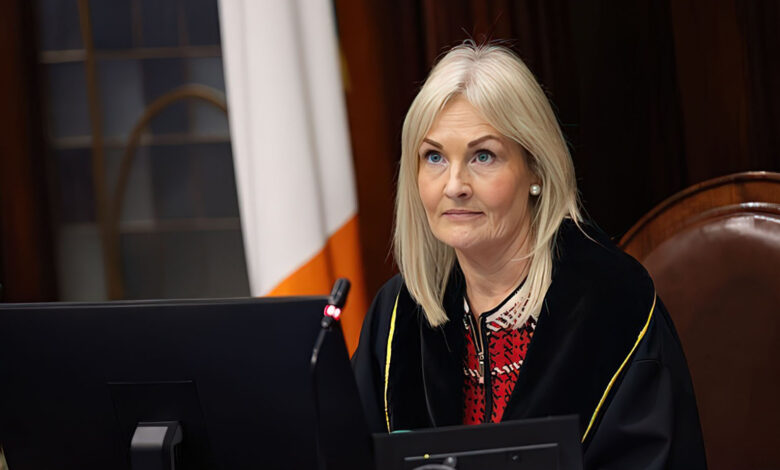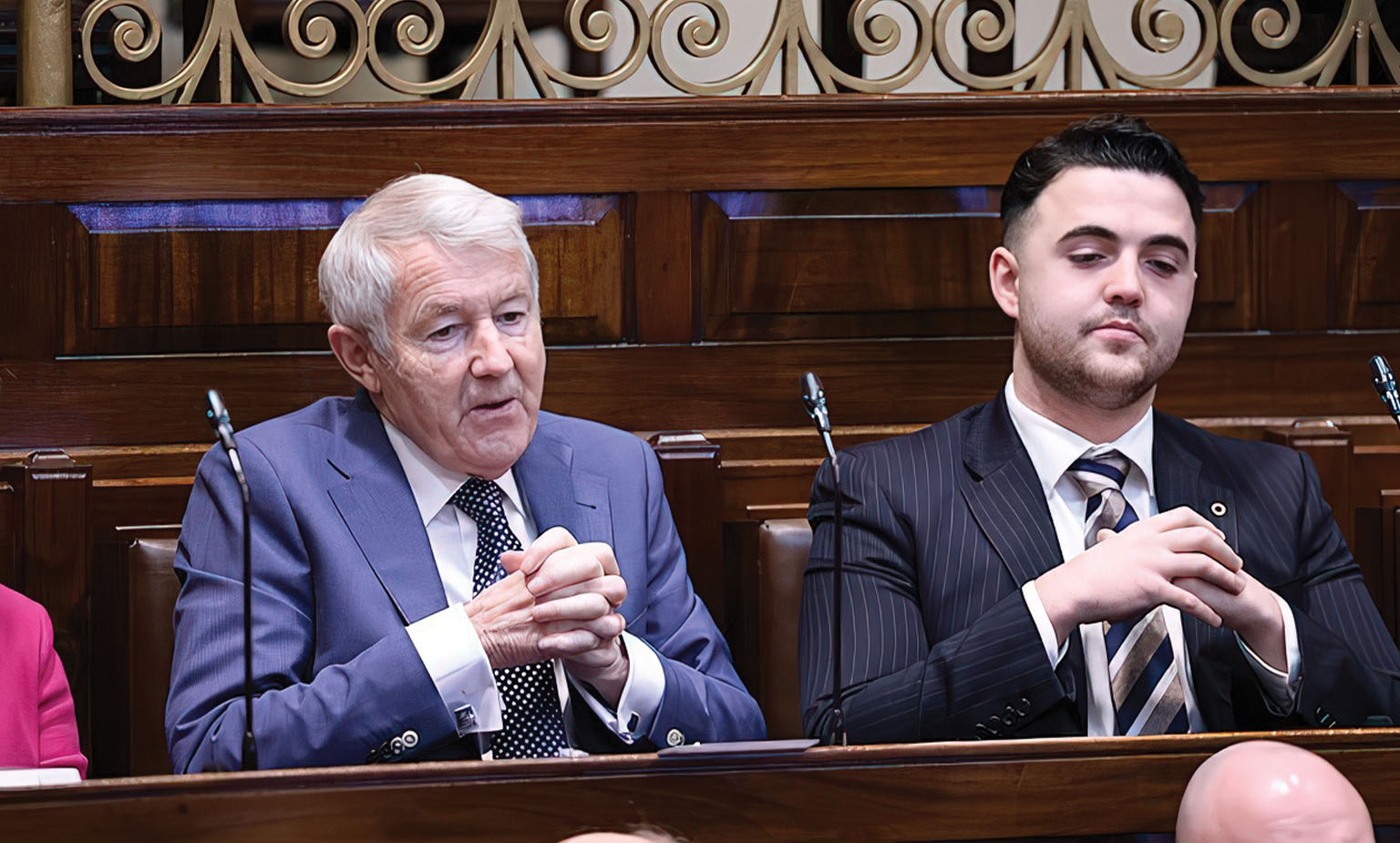Opposition victory in Dáil speaking rights row

Ceann Comhairle Verona Murphy TD was forced to back down on her initial decision to grant speaking rights to the Rural Independents Group (RIG). In this context, eolas Magazine examines the context which led to this decision, and its alignment with the Dáil’s standing orders.
The Regional Independents Group (RIG), a technical group comprised of nine independent TDs, negotiated as a block of TDs with Fianna Fáil and Fine Gael. From this, Kevin ‘Boxer’ Moran TD became a Minister of State, and the negotiations are understood to be the basis upon which Murphy was nominated as Ceann Comhairle.
When the 34th Dáil had its first sitting – 71 days after general election 2024 was held – proceedings were suspended twice in quick succession after opposition TDs voiced their contempt for the Ceann Comhairle’s initial decision to grant speaking rights to backbench members of the Regional Independents Group on an interim basis, while awaiting legal advice which she told the Dáil she was evaluating. At the time of writing, Murphy has not announced what the legal advice was, and this is set to be discussed in a Dáil reform committee.
What is a technical group?
A technical group is a parliamentary arrangement, mostly unique to Ireland, that allows independent TDs and smaller parties to band together for the purposes of securing greater speaking time, priority in debates, and representation on committees. Unlike most European legislatures, most notably the House of Commons, political groups in the Dáil must have a certain number of TDs to gain speaking rights during parliamentary proceedings, and government backbenchers are not granted speaking time during Leaders’ Questions.
While such groups do not necessarily have a shared political ideology, they function as a means for smaller voices to gain procedural advantages in a legislature that traditionally prioritises larger parties.
In essence, the RIG would be both in government and, technically, in opposition.
The controversy on speaking rights arose because the RIG sought to form an opposition group while simultaneously nominating one of its members as a junior minister in the government as part of the Fianna Fáil-Fine Gael coalition.
Opposition leaders, particularly from Sinn Féin and Labour, argued that this was an attempt to manipulate the rules, allowing pro-government TDs to encroach on opposition time without actually being in opposition. The opposition’s strong pushback against this move was ultimately upheld by the Ceann Comhairle’s ruling, reinforcing the principle that technical group privileges should reflect genuine political alignment rather than strategic manoeuvring.
Should the Regional Independents Group have speaking rights?
Murphy’s decision to deny the RIG opposition speaking rights must be assessed against the Standing Orders of the Dáil. Standing Order 170 explicitly requires that opposition speaking rights be granted only to those who are “in Opposition”.
While the RIG is formally a technical group and not a political party, its nine TDs negotiated as a group with Fine Gael and Fianna Fáil. Arguably, since it negotiated like a political party, ensured that its policy priorities were put into the Programme for Government, and, in parliamentary terms, is a political party, it is arguable that all of the group’s members should be classified as being ‘in government’, akin to backbench TDs from the Green Party in the 33rd Dáil.
While Michael Lowry and other members of the RIG argued that independent TDs should have greater flexibility in their parliamentary classification, the rules do not support such an interpretation.

With the Ceann Comhairle’s ruling, there will be no speaking rights granted to any of the members of the RIG. Furthermore, unlike in other legislatures, the deputies will be bound to these terms for the rest of the Dáil’s term, as a member cannot ‘cross the floor’ to join a technical group, as demonstrated in 2015 when three Fine Gael TDs resigned the party whip, former a new party – Renua – and were not able to join or form a technical group.
The Dáil’s procedural framework is designed to maintain clear distinctions between government and opposition, ensuring that speaking rights align with a TD’s actual political stance. In this context, Murphy’s ruling was in line with parliamentary procedure.
Political fallout
Fianna Fáil leader and Taoiseach Micheál Martin TD has not publicly commented on the ruling, although he has stated that the Dáil reform committee should examine whether the standing orders are fit for purpose in their current form.
Expressing disappointment with the ruling, the RIG’s de facto leader, Michael Lowry TD called for new procedures to accommodate independent TDs who support the government, criticising the Ceann Comhairle’s handling of the controversy as “excessive” and as having “caused problems for everyone”.
Sinn Féin president Mary Lou McDonald TD welcomed the ruling. McDonald had previously criticised the RIG’s attempt to gain opposition speaking time, describing it as a “brazen sham.” She emphasised the importance of maintaining the “integrity of parliamentary procedures” and ensuring that opposition time is reserved for those genuinely holding the government to account.
For Murphy, it is arguable that this decision has saved her role as Ceann Comhairle, as there was a level of unity among opposition TDs – ranging from Sinn Féin, to Labour, the Social Democrats, Independent Ireland, and People Before Profit-Solidarity – which has rarely been observed in modern Irish politics.
While no Ceann Comhairle has been ousted since James Dillon in 1982, the removal of John O’Donoghue as Ceann Comhairle in 2009 was arguably as a result of pressure from opposition TDs, most notably Eamon Gilmore, and it is widely accepted that a functioning Ceann Comhairle must have the confidence of both the Government and the opposition alike.
The Taoiseach’s remarks on Dáil reform, namely that the Standing Orders should give all TDs “reasonable access to speaking time”, could see changes made to the Standing Orders, but there can be no doubt that the procedures were implemented as designed, and any changes to speaking rights can only be made via reforms to the Dáil’s standing orders.
Standing Order 170(1) Formation of technical groups. A body of members in opposition, not being a party, may be accorded group rights in the Dáil, provided that:
|





